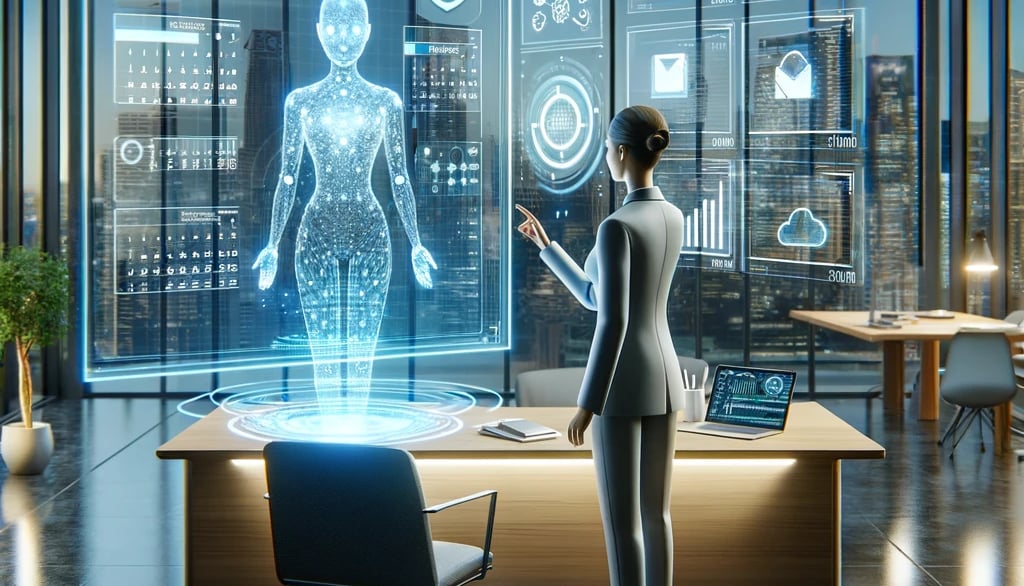Into the Future: The Evolution of Artificial Intelligence
Artificial Intelligence (AI) has made remarkable strides in recent years, transforming industries, revolutionizing technology, and reshaping the way we live and work.
6/17/2024


Artificial Intelligence (AI) has made remarkable strides in recent years, transforming industries, revolutionizing technology, and reshaping the way we live and work. As we look ahead, the future of AI holds boundless potential, with advancements in machine learning, robotics, and cognitive computing poised to unlock new possibilities and redefine the human experience. In this article, we'll explore how AI is set to evolve in the future and the profound impact it will have on society.
1. Advancements in Machine Learning
Machine learning, a subset of AI that enables systems to learn from data and improve over time without explicit programming, will continue to be a driving force in AI development. Future advancements in machine learning algorithms, such as deep learning and reinforcement learning, will enhance AI capabilities in areas such as natural language processing, computer vision, and predictive analytics. These advancements will enable AI systems to perform increasingly complex tasks with greater accuracy and efficiency, opening up new opportunities for innovation and discovery.
2. Human-Machine Collaboration
The future of AI is not about machines replacing humans but rather augmenting human capabilities and enhancing collaboration between humans and machines. As AI technologies become more sophisticated, they will empower humans to work more effectively and creatively, augmenting our decision-making processes, automating routine tasks, and providing valuable insights and recommendations. Human-machine collaboration will lead to the emergence of new roles and job opportunities, as well as new ways of working and interacting with technology.
3. Ethical and Responsible AI
As AI becomes more pervasive in society, there will be an increased focus on ensuring that AI systems are developed and deployed ethically and responsibly. Future advancements in AI will be accompanied by greater scrutiny and regulation to address concerns around bias, transparency, accountability, and privacy. Ethical AI frameworks and guidelines will be established to govern the use of AI technologies and ensure that they align with societal values and norms.
4. Autonomous Systems and Robotics
Advancements in robotics and autonomous systems will enable AI to move beyond the digital realm and interact with the physical world in more meaningful ways. From autonomous vehicles and delivery drones to robotic assistants and industrial automation, AI-powered robots will play a central role in transforming industries and revolutionizing the way we live, work, and travel. These autonomous systems will enhance productivity, efficiency, and safety while unlocking new opportunities for exploration and discovery.
5. Personalized and Context-Aware AI
The future of AI will be characterized by personalized and context-aware systems that adapt to individual preferences, behaviors, and environments. AI algorithms will leverage data from various sources, including sensors, wearables, and IoT devices, to deliver tailored experiences and recommendations in real-time. Whether it's personalized healthcare treatments, customized learning experiences, or context-aware smart assistants, AI will empower individuals to live healthier, more productive, and fulfilling lives.
Conclusion: A Future of Possibilities
As we look to the future, the evolution of AI promises to usher in a new era of innovation, discovery, and progress. From advancements in machine learning and human-machine collaboration to ethical and responsible AI, autonomous systems, and personalized experiences, the possibilities are limitless. By embracing the potential of AI and harnessing its transformative power, we can shape a future that is smarter, more inclusive, and more equitable for all.
Offices
Melbourne: 101 Collins St Melbourne VIC 3000 +613 9999 7379
Sydney: 2 Chifley Square, Sydney NSW 2000 +612 8880 0307
Queensland: 46 Cavill Ave, Surfers Paradise QLD 4217 +617 3667 7473
Texas: 200 W 6th St, Austin, TX 78701
London: 22 Bishopsgate, London EC2N 4AJ


